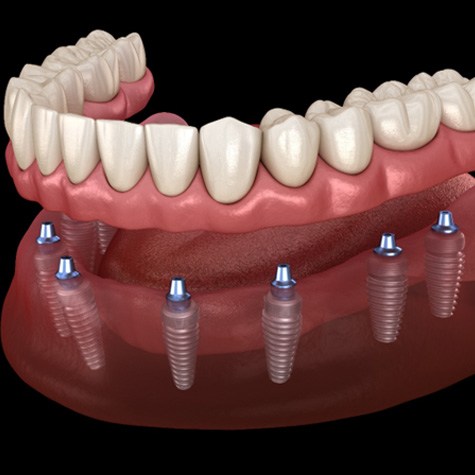SMILES 4U
Doylestown, PA 18901 (215) 345-6500 REQUEST AN APPOINTMENT
Living with missing teeth can be embarrassing, frustrating, and inconvenient. Whether lost as a result of poor oral hygiene or severe trauma, you may find yourself in a position of desperately wanting to replace them but are unsure of how to start. Dr. Olga Kandov understands the needs of individuals like yourself. You want a solution but have numerous questions about the process, cost, and functionality of your new smile. While there are many tooth replacement options, the one people most commonly turn to is dentures. Considered to be one of the safest and most reliable restorations available, Dr. Kandov can recommend full, partial, or even implant-retained dentures as a way to rebuild, repair, and fully enhance your smile. Get started today by giving us a call!

As long as you possess the following criteria, you should have no problem rebuilding your smile with dentures:
During your consultation with Dr. Kandov , she will thoroughly examine your oral cavity and facial structure using advanced technology and equipment to identify whether it is possible for you to benefit from dentures.

You don’t want to wait too long to replace missing teeth because doing so could cause more problems for your smile. Leaving gaps in your mouth could increase your risk of other common oral health problems, like the deterioration of supportive hard and soft tissues within the mouth, like your jawbone and gums, as well as decay and infection. Not to mention, living without teeth can lead to a decline in your psychological and emotional wellbeing by making basic daily tasks like eating and speaking much more difficult.

To learn whether you’re a good candidate for dentures, you’ll need to schedule a consultation with Dr. Kandov. During your visit, our team will conduct a thorough visual examination of your teeth and gums as well as collect any necessary diagnostic imaging. Based on our findings and several key factors, like how many teeth you’re missing, their locations, and your smile goals, we’ll be able to walk you through all of your treatment options .
We typically recommend full or partial dentures for those missing several or all of their teeth and have good dental health. If we find any lingering oral health problems like gum disease, we’ll likely recommend treating these before moving forward with your restorative procedure. That way, you have a healthy and strong foundation for your new replacement teeth to be supported by.

Traditional dentures are a natural-looking, cost-effective option for many patients facing tooth loss; however, if you’d rather invest in a more lifelike and permanent restoration, you may want to look into dental implants.
These can be placed below the gumline and into the jawbone to support a full restoration, dental bridge, or crown to restore any number of gaps in the smile. Because they’re made of titanium, they’re able to naturally fuse with the jawbone through a process called osseointegration, allowing you to replace missing teeth without having to alter any surrounding ones. They also boast an impressive lifespan of over 35 years and can completely eliminate the threat of slipping or shifting dentures.

There are three different types of dentures you may be eligible to receive. These include:
Should you be missing all your teeth along the top or bottom arch, or both, a full denture can restore the look of your smile. Using artificial teeth that are placed into a gum-colored, acrylic base, your natural suction will help to keep them in place.
If you are missing several teeth along an arch, a partial denture can be used to restore your smile. These missing teeth can either be consecutive or spread out. Using the same materials as a full denture, the only difference is that a partial denture will have clasps or clips that attach to your natural teeth to hold them in place.
If you prefer a more stable, permanent solution, implant-retained dentures can give you the look you desire. Instead of having a restoration sit on top of your gum line much like a full or partial denture, an implant-retained denture uses titanium posts that are surgically placed into your jawbone. After months of healing and allowing the implants to fuse to the bone and surrounding tissues, your customized denture is secured to the top of the implants to create a fully restored smile.
Learn More About Implant-Retained Dentures

Knowing how dentures are made will help you to become more appreciative of your new smile. These uniquely designed prosthetics deliver greater function and aesthetics than living with missing teeth, but they do require much attention and precision when moving through the creation process. If you would like to learn more about how these artificial pearly whites form to create a beautiful new smile, keep reading.

There are two pieces that work together to create a complete denture – the base and the artificial teeth.

The process of creating dentures starts with an impression of your mouth. After capturing the shape and arrangement of your gums and remaining teeth (if there are any), we will send them off to a dental lab, where technicians will create a wax model of your dentures. Our team will then evaluate how it fits, its appearance, and how it functions before the final denture is created. The bite alignment, tooth shade, size, and shape are all determined before the wax model is sent back to the lab for further creation.
The wax model is placed into a flask that holds plaster that is poured in to form the shape of your dentures. The flask is then placed in hot water so that the wax melts. Acrylic is then injected into the flask to replace the wax, and the plaster is removed once the acrylic dentures are placed in an ultrasonic bath. After giving the dentures a final polish and cutting any excess acrylic away, the dentures are ready for our team to receive so that you can undergo a fitting.

It’s natural for it to take time to adjust to your new dentures, as these are foreign objects that your lips, cheeks, and tongue must become accustomed to. Some common adjustments you can expect include:

Daily living gets tricky when you don’t have all your teeth. Eating and speaking, for instance, can become downright difficult. Similarly, trying to smile may feel embarrassing. All that said, though, the benefits of dentures can overcome such issues. The prosthetic teeth, in fact, will boost your overall quality of life! As for how they’d do so, our office is happy to explain. Just keep reading, or call us directly for the details!

It’s usually hard for people to accept tooth loss. The condition, after all, replaces your full smile with a gapped one. As a result, sufferers often experience low self-esteem and body image. These effects, in turn, can then lead a person to socialize less and develop deep sadness or depression.
Still, dentures usually help with these mood problems. Those who wear them enjoy restored grins, which lead to high confidence and low anxiety. The patients are then at ease regarding their looks, speech, eating ability, etc.

When you lack pearly whites, it’s hard to speak. That’s only natural – teeth help position your lips and tongue as you talk. As such, being without them makes many words hard to say clearly.
Thankfully, quality dentures act as substitute teeth. You can trust them to support your tongue and lips for speech. They do, however, require an adjustment period. Only when you’ve passed it can you speak naturally again.

As you might know, teeth are crucial for chewing food. Tooth loss, then, usually leads to diminished meal choices. Many healthy items, you see, have tough textures – veggies and fruits, lean proteins, etc. Those without teeth may have to give them up, resulting in malnutrition or indigestion.
Dentures, though, would prevent that outcome. They let patients chew food almost as well as natural teeth. In doing so, the prosthetics widen your dietary options and ensure you get crucial nutrients.

Admittedly, tooth loss usually stems from dental damage. Even so, it can harm your oral health. By producing smile gaps, it creates breeding spots for harmful bacteria. Those spaces, furthermore, can also make surrounding teeth tilt and fall out.
Dentures preserve oral health by “filling in” your smile gaps. For starters, nasty germs have fewer places to grow without them. Plus, having the restorations means your chompers are less likely to tilt or fall.

For better or worse, a beautiful smile is key to good first impressions. People note your grin before any of your other bodily features. Given that fact, your social life – with friends, family, co-workers, etc. – will be more lively if you have a mouth full of pretty teeth.
Dentures, of course, can give you such teeth. Their pearly whites look highly realistic and blend seamlessly. They’ll thus improve your relationships with all sorts of people. This perk could even extend to your boss, leading to promotions or raises. Your denture treatment could then pay for itself!

No two smiles are exactly the same, so it’s only natural that the cost of dentures can vary from patient to patient. After all, Dr. Kandov doesn’t believe in cookie-cutter dentistry! Every restoration and treatment plan she creates is custom-made to fit the unique needs and preferences of each of her patients. During your initial consultation, she’ll provide a personalized estimate for how much you can expect to pay. Plus, she and her team will be happy to review all your financial options for making dentures as affordable as possible. In the meantime, read on to learn more important information about the price of dentures.

We’ll put together your estimate during your initial consultation based on several key factors:
When choosing where to get your dentures from, it’s important to keep in mind that less expensive is not always ideal! Cheap dentures are likely made of subpar materials that will fail you or wear down in a matter on months. When it comes to your smile, quality is important!

The newest and most popular style of denture is an implant denture. Instead of resting on the gums or attaching to remaining teeth with clasps, an implant denture is anchored directly into the jawbone with small titanium posts called dental implants.
Implant dentures are generally more expensive than their traditional counterparts. However, many patients find that their unmatched stability, comfort, and functionality are well-worth the price. Plus, implant dentures can potentially last a lifetime, which would save you thousands of dollars in repairs, readjustments, and replacements over the years.

Every dental insurance policy differs, but dentures are often covered. They are usually categorized as a “major restorative treatment,” which can earn them about 50% dental insurance coverage in most cases! Our team has years of experience navigating the details of various insurance plans and will make sure that your benefits are being maximized and your out-of-pocket costs are minimized.

If you don’t have dental insurance, your dentures are not necessarily out of reach. We offer several helpful options for uninsured patients to make the care they need affordable, including:

Are you looking for a qualified professional to replace your missing teeth with dentures? Dr. Olga Kandov and her team are here to deliver the results you need to start enjoying a better quality of life. But before you get started, we know you probably have many questions about your treatment and what to expect after you’ve been fitted with your customized prosthetics. This is why you will find a list of denture FAQs below. Should you not see your question or have other concerns, please do not hesitate to contact our office to schedule an appointment.
It is not uncommon for dentures to become loose over time. After all, the first set you receive is not designed to last forever. As you age, your facial shape can change, causing your jaw to narrow and result in your denture no longer fitting as comfortably as before. When this happens, you can contact our office and Dr. Kandov will work to reline your prosthetic. This process will allow your denture to fit snugly in place and feel more comfortable.
When it comes to taking care of your dentures, you want to do everything you can to extend their lifespan. To do this, you will need to make sure that you brush your prosthetic after every meal. The cleaning process should include using a soft-bristled toothbrush or a special denture brush to remove bacteria and food particles. Never use toothpaste, as it can be too abrasive and scratch the acrylic.
Absolutely. Just because you no longer have natural teeth doesn’t mean that you can avoid regular dental checkups and cleanings. You are still at risk for developing gum disease if you are not careful, so by seeing your dentist, you can ensure there are no problems occurring within the soft oral tissues. These visits also allow Dr. Kandov to examine your dentures to make sure no damage or flaws are developing that could cause issues in the future.
When receiving a new partial denture, Dr. Kandov will make sure the lab technicians have the exact shade needed to produce a prosthetic that perfectly matches your natural teeth. However, if over time your partial begins to stand out because of changes occurring to your natural teeth or your prosthetic becomes scratched or dulled, the only way to create an even look is to have a new partial created.
It is possible that you will develop a temporary lisp when you first begin wearing dentures. This is not uncommon, as your tongue, cheeks, and jaw will need to adjust to the new fixtures in your mouth. The good news is that it should not last long and can be quickly remedied by practicing your sounds and slowing your speech. Once you feel more confident and comfortable saying more difficult words or sounds, you will notice the lisp dissipate.